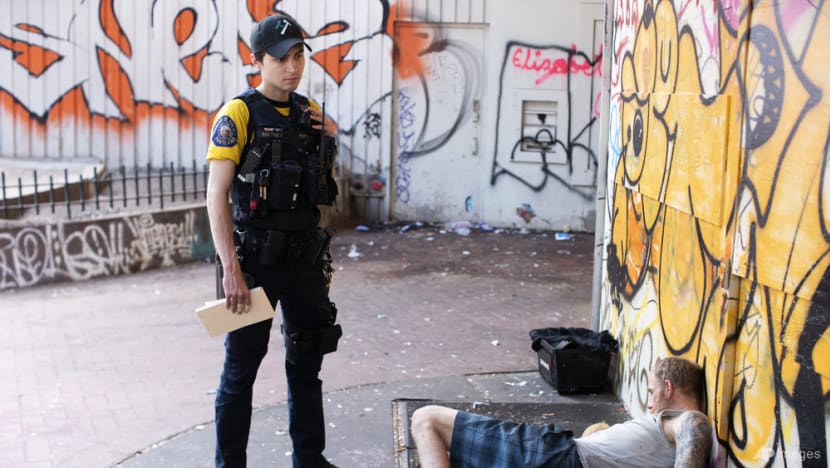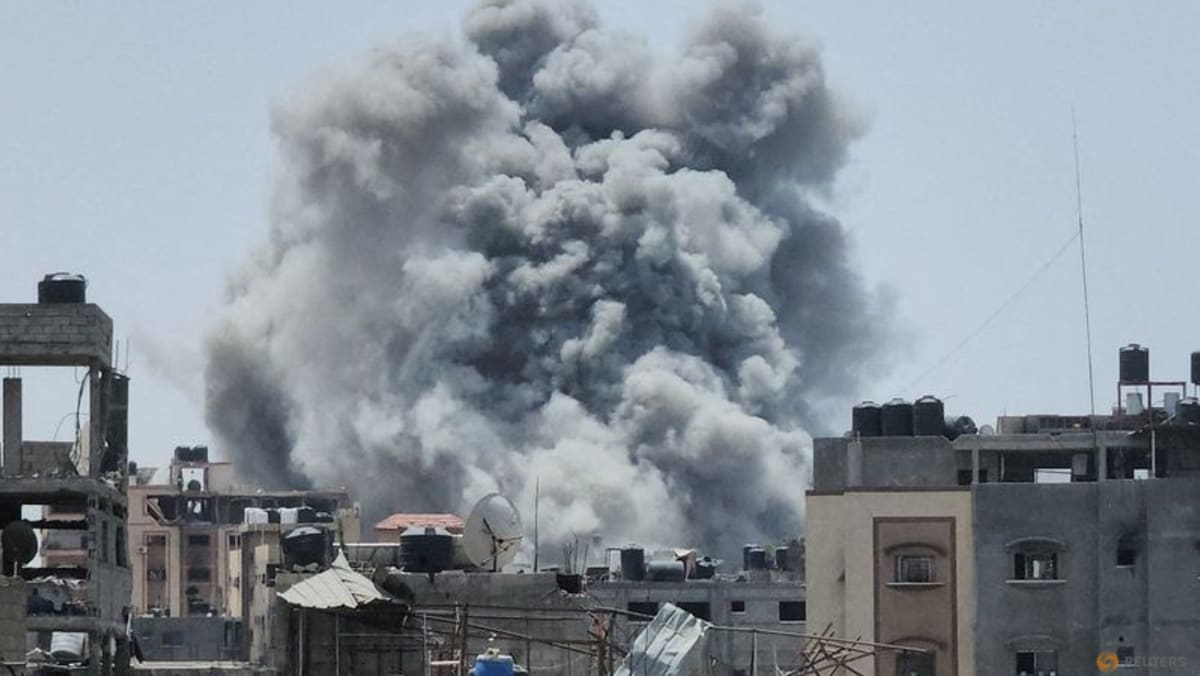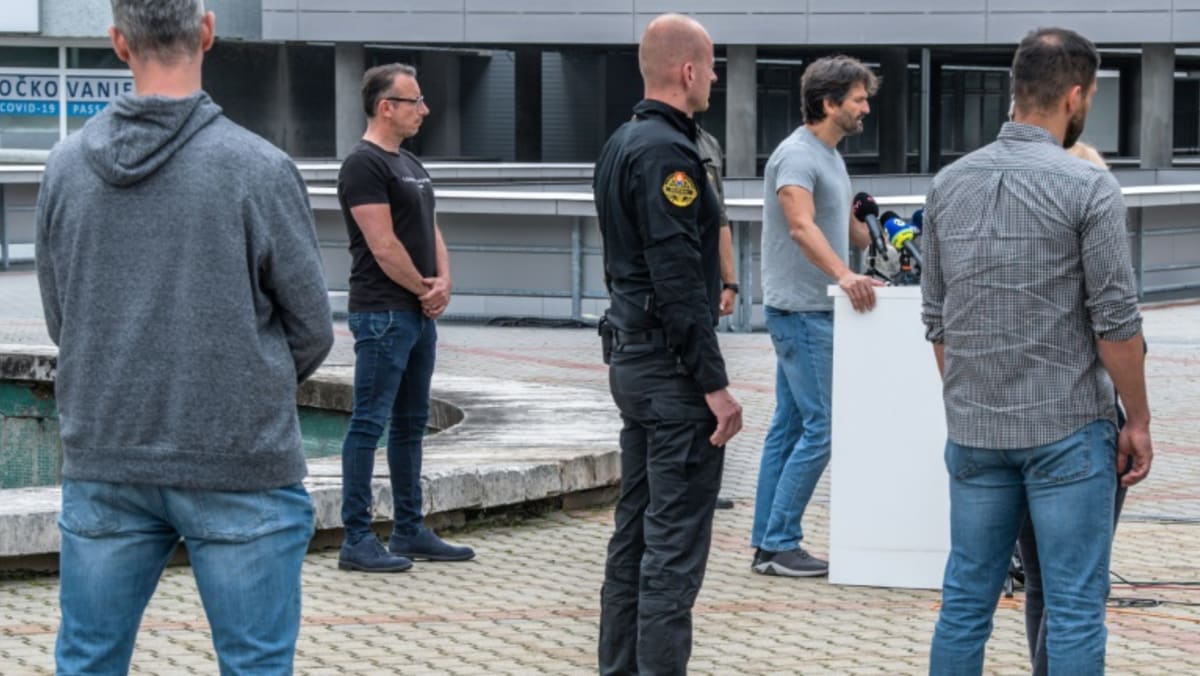CNA looks at how drugs have ravaged the United States and Europe, and what the authorities are doing to tackle the pressing issues.
 An officer from Portland Police Bureau's bike squad stands next to a person who appears to be passed out on May 18, 2023 in the US city of Portland, Oregon. (Photo: Beth Nakamura/The Oregonian via AP)
An officer from Portland Police Bureau's bike squad stands next to a person who appears to be passed out on May 18, 2023 in the US city of Portland, Oregon. (Photo: Beth Nakamura/The Oregonian via AP)
New: You can now listen to articles.

Sorry, the audio is unavailable right now. Please try again later.
This audio is AI-generated.
WASHINGTON / BRUSSELS: What started as a normal college drinking experience for Ms Megan Cohen turned into a years-long nightmare, when the American got hooked on hard drugs.
She struggled to kick the habit, going through the recovery process more than 70 times. But many others like her do not live to tell the tale.
Over the last two decades, the United States has gone through the worst overdose epidemic in its history, with the number of deaths linked to drug overdoses rising almost every year.
A record 108,000 Americans lost their lives to overdoses in 2022, according to recent government figures. More than two-thirds were linked to synthetic opioids – mainly illicitly manufactured fentanyl, which is 50 times stronger than heroin.
Things do not look much better on the other side of the world.
The European Union is battling a surge in drug trafficking and drug-related crimes such as gang violence.
In 2021 alone, law enforcement officials seized a record 303 tonnes of cocaine at Europe’s ports.
Violence among gangs rose in the Belgian city of Antwerp when drug cartels moved their operations there. Such gang violence has since spread to the capital Brussels – home to the EU institutions and the North Atlantic Treaty Organization (NATO) headquarters.
OVER US$1 TRILLION SPENT FIGHTING DRUGS
In the US, more than 800 people died from drug overdoses in the city of San Francisco – a new record.
Officials believe most of these cases involved fentanyl, which can be deadly even in small doses.
US President Joe Biden previously said his administration is “working intensely to address this threat from every angle”, adding that fentanyl is likely the number one killer of Americans aged 18 to 45.
For some drug policy advocates, this will not go far enough.
“More than a trillion dollars … have been spent in the name of the drug war. That's not even counting lives lost, whether it be to incarceration or because of deadly police encounters or other ways that we know people die in the drug war, including overdose,” said Ms Maritza Perez, director of the Office of Federal Affairs at Drug Policy Alliance, a New York City-based non-profit organisation (NGO).
“All evidence tells us that the approach that we've taken has been a failure,” she added.
Another NGO, Shatterproof, is on the frontlines of the war on drugs and aims to end the addiction crisis in the US.
Its chief public policy officer Kevin Roy said there has been progress in terms of treatment and access to treatment, along with life-giving medications.
“However, there's still a lot of work to be done and unfortunately, the crisis grows. So I think the most consequential but least utilised tool in terms of addressing addiction is prevention,” he added.
OPIOID OVERDOSE MEDICATION
The White House has launched a nationwide call to action, the Challenge to Save Lives from Overdose, to make the opioid overdose medication Naloxone more accessible. Naloxone rapidly reverses an overdose, such as by restoring breathing.
It could play a vital role in areas like Kensington Avenue in the city of Philadelphia, where one of the US’ biggest open-air drugs markets is located.
Ms Cohen told CNA that she spent much of her mid-20s there when she was addicted to drugs. She has since founded Grace Project, an NGO that seeks to help vulnerable communities in need.
It currently conducts a weekly outreach programme in the area, handing out food, clothing, first aid and hygiene supplies to the homeless.
“Things that I said I was never going to do, like steal from my mum - those things started happening,” she recounted.
“And then it was like, oh, I’ll never sell drugs, or I’m never going to do heroin or I'm never going to smoke crack, and then those things happened.”
 Ms Megan Cohen speaking to CNA (L), and when she was hooked on drugs (R).
Ms Megan Cohen speaking to CNA (L), and when she was hooked on drugs (R).
VIOLENCE IN EUROPE OVER DRUGS
In Europe, French drug user Giles (not his real name) told CNA that getting access to drugs has never been easier in his 18 years of being an abuser.
“It's very easy. In less than five minutes, I can get drugs,” he added.
But this has come at a cost. He said he was stabbed in the legs and has buried three friends in the last month.
Illegal drugs are flooding into Europe, and authorities are struggling to keep up.
One key drug hotspot is Antwerp – Belgium’s biggest and Europe’s second largest seaport. In 2023, Belgian authorities seized a record 116 tonnes of cocaine there, which made up a third of all EU seizures.
Just an hour north is Europe’s largest port: Rotterdam in the Netherlands. Decisions there have had a major impact on Antwerp, as well as Belgium as a whole.
When Rotterdam automated large parts of its container handling, drug cartels no longer had access to dock workers to help with smuggling. They moved their operations to Antwerp instead, leading to a spike in gang violence in the city.
This has spread to Brussels, which has seen a spate of gang-related shootings in recent months.
An estate in the city’s Anderlecht district has meanwhile become a hotbed of crime and drug dealing for months.
At its peak, police struggled to contain the influence of local criminals. Dealers even set up checkpoints, blocking roads and conducting ID checks for people entering the housing blocks.
Law enforcement officials are now attempting to regain control of the estate by banning people from going there, including local residents, if needed. Patrols have also increased, and stricter sentences are being meted out to those found to have broken the law in the area.
DIFFICULT TO TACKLE SYNDICATES
Mr Teun Voeten, an anthropologist and journalist specialising in drug trafficking, said the struggle against crime syndicates is “very difficult” due to their creativity and flexibility.
He added: “If Belgium installs a new system of controlling, checking containers, (it) will take one or two years to install the system and to implement and to discuss. The drug organisations, they switch the same day.”
To better coordinate police efforts across the continent, the EU will launch a new drugs agency in about two months.
But experts said that without addressing the underlying causes of drug use and drug trafficking, there is only so much law enforcement can do.
Mr Bruno Valkeneers, who has worked with addicts for more than 20 years, said that more police crackdowns will simply drive Europe’s drug problems further underground – and visible addicts are only a part of the problem.
“We see that since a few years now, cocaine is everywhere,” he said.
“I think that 90 per cent of the drug users are not addict people. They are working in enterprise; they are lawyers; they are students.”













 English (US) ·
English (US) ·  Turkish (TR) ·
Turkish (TR) ·